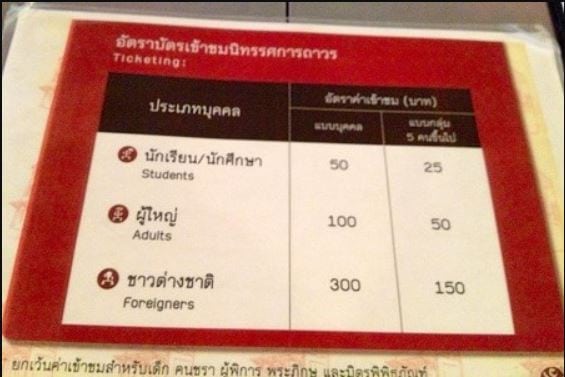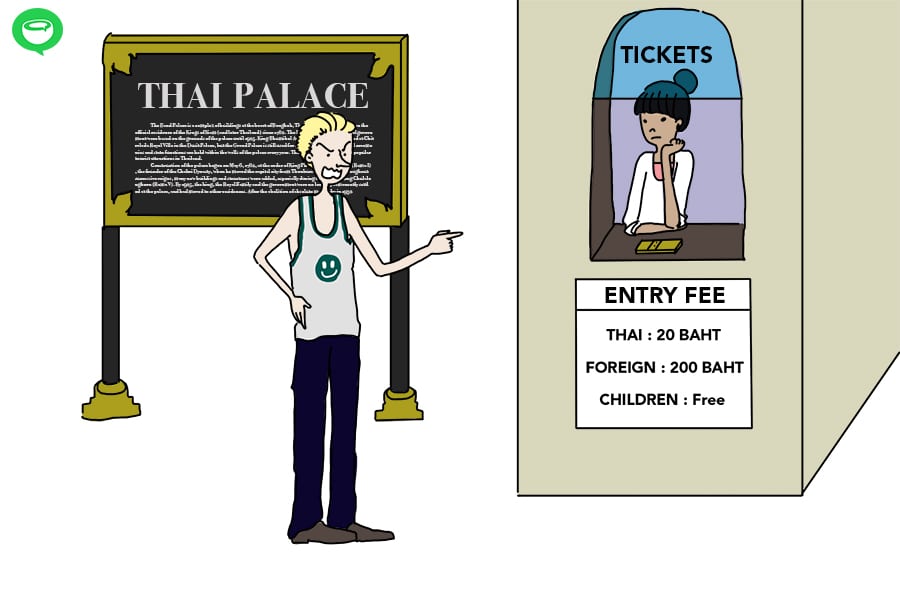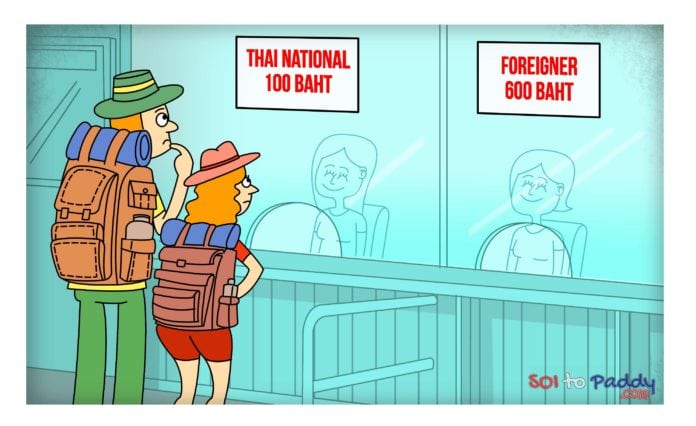If you've been living in #Thailand for any length of time, chances are you have come across dual pricing. This is the practice of charging foreigners different prices for the same item or service than Thais pay.
In Thailand, this presents itself as differing prices for Thais and foreigners. While the issue never crosses most Thai people's minds, it can make foreigners feel angry or taken advantage of.
There are even websites devoted to this phenomenon. One popular site, 2PriceThailand, advocates for abolishing the dual price system and teaches foreigners Thai numbers so that they can better know when they are entering a place that employs a dual pricing system, whether overtly or covertly.
The admins of the site say, "The dual pricing system is hurting the image of both the tourism industry and Thailand itself. Thai people are internationally known for their kind and generous hospitality.
The actions of a few tourist attractions are damaging that reputation. We respectfully request a transparent pricing system in Thailand."
Coconuts checked in with Kasetsart University's Intercultural Communications Professor Rachawit Photiyarach, who has thought long and hard about this topic. Here, he answers our questions and makes some points you may have never considered.
What is dual pricing?
There are two types of dual pricing: interpersonal and institutional.
Institutional dual pricing is the practice of an institution, such as a museum, attraction or national park, having clearly stated policies for charge different groups of people different prices.
Places like the Grand Palace, for example, charge foreigners the exorbitant sum of THB500, while Thais are charged the somewhat smaller sum of, well, absolutely nothing.
Interpersonal dual pricing is when an independent seller charges different buyers different prices for the same item and it happens on a case-by-case basis.
This one is much more insidious since it feels, well, personal.
Interpersonal dual pricing happens when a street vendor looks at someone and decides that, for whatever reason, they can or will pay more than their peers for a plate of somtam.
It also happens when a taxi driver refuses to use the meter or when anyone, anywhere interacts with a tuk-tuk driver.
It can even happen when you are looking to lease an apartment and how much you are charged in rent.
What's the problem with dual pricing?
Dual pricing causes two kinds of issues for people: emotional and financial. It's hard for many foreigners — the most common victims of dual pricing — to make peace with the concept that they need to pay more than other customers simply due to their ethnicity.
You see, according to the professor, Asian tourists from outside of Thailand, such as Korean, Japanese or Chinese visitors, are charged the local rate based on their appearance despite the fact that they aren't Thai and can't speak a word of Thai.
Wait. Isn't that racist?
In a way it is. "They make their judgements about pricing based on stereotypes and racial profiling," said the professor.
What can people do to combat institutional dual pricing?
In cases of institutional dual pricing and attempting to get a lower price, the professor suggests strategies for showing the staff that you are not a tourist.
Some people have had luck with displaying a Thai ID, driver's license, work permit or even a local bank card to prove they are residents.
Others have had success when they speak Thai and explain that they are not tourists and would like to pay the local rate.

Alternately, sometimes no matter what you tell them, they still simply see a foreigner who must pay the foreigner rate.
How can they deal with interpersonal dual pricing?
Any of the strategies above might help you negotiate with an independent seller as well. Speaking Thai is the most likely way to get them to give you the local price for your plate of krapow or cup of iced coffee.
If you'd rather not encounter interpersonal dual pricing at all, you can frequent businesses that don't employ the practice.
Ride apps like Grab and Uber ensure that you won't be overcharged for transportation while buying food from vendors with prices on display ensures that your server won't rip you off for not being Thai.

Dual pricing makes me so angry. How can I deal with that?
To deal with an emotional reaction to dual pricing, try thinking about the policy logically, understanding why it's done and remembering that it's not intended as an insult toward you, personally.
It's quite normal to have an emotional reaction to dual-pricing. Victims report feeling singled out, rejected, judged, stereotyped or even violated by episodes of dual pricing.
What's the reasoning behind dual pricing?
Some of the underlying reasons for dual pricing are based on assumptions and stereotypes that all foreigners are rich.
The professor explained that it's assumed that many foreigners, whether expat or tourist, have lots of money. The reasons for this are two-fold and, in some ways, make perfect sense.
As an expat, in order to secure a work permit in Thailand you must make a certain amount of money each month and that amount is far higher than most Thai workers make.
So, in that way, when an institution or vendor views you as someone with more money than a Thai peer, they may be right.
As a tourist, the assumption is that, if you live the sort of lifestyle that would allow you to vacation on the other side of the world, you must have money.
It actually makes sense. It's not the poorest segment of the population that can afford exotic vacations.
Of course, the legitimate counter-argument is that, even if it's true, a bowl of tom yam should have the same market price no matter who it's being sold to.
An additional reason why locals are often admitted free or very cheaply to attractions such as temples, museums and historical landmarks is because the government does not want them to miss out on seeing important parts of their heritage simply because they don't have the money to pay the admission fee.
The belief is that all Thais, even the poorest citizens, have the right to visit these places and should not be penalized for having little money.
How should foreigners NOT react to dual pricing?
The professor noted that it's not worthwhile to get angry with institutional staff that employ a dual price system. They didn't create the policy and may not even agree with it.
We've all seen a foreigner shrieking at a blank faced ticket booth worker who can do little to help them and, if they could, they certainly aren't going to after being shouted at.
In fact, it's best not to get angry at street vendors that use this practice either. The best thing to do is to calmly take your money and spend it elsewhere. – Coconuts




Inga kommentarer:
Skicka en kommentar